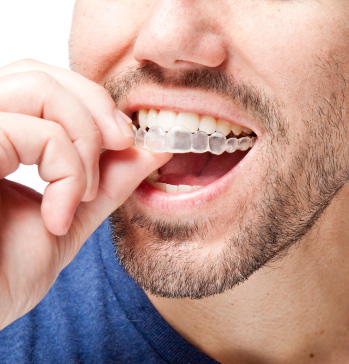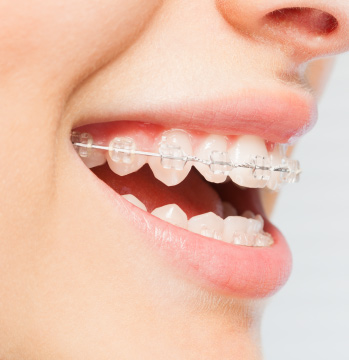Treatments
that’ll have you
beaming
You’re unique and should be treated that way. We offer you a wide selection of orthodontic solutions, including Invisalign®, Damon® Braces, and Damon® Clear.
We’ll help you find a solution that’ll have you beaming.
Treatments for
Children & Adults
Orthodontic treatment for children can begin as early as age 7, while your child’s teeth are still developing and the jaw is still growing. Contact us to discuss how early treatment may make orthodontic issues easier to address.
Missed out on orthodontic work as a kid? More and more adults today are seeking orthodontic treatment. In fact, about 25% of our patients are adults! You can find a wide range of treatments specifically designed for adults – leaving you with a radiant smile and healthier bite.
Put yourself first and ask us about treatment.
The Benefits of A
Healthier Smile
Orthodontic care is about so much more than straightening teeth. It’s about improving your overall health so you can live life on your terms! Benefits of orthodontic treatment may include:
- Greater confidence
- Better oral health (Teeth are easier to brush and floss, reducing tooth decay and the potential for some gum problems)
- Decrease potential for oral injury (Aligned teeth have decreased chance of fracture)
- Prevent issues with chewing and digestion
- Ability to better manage TMJ (temporomandibular joint) pain and dysfunction.
Frequently asked questions
Why should I choose an orthodontic specialist?
Orthodontists are uniquely qualified in the diagnosis, prevention, and treatment of orthodontic problems. The alignment of the teeth, the smile, and frequently the facial profile and jaw function are changed by orthodontic treatment, so it is important that the treatment be appropriate and properly completed. Orthodontic specialists are dentists that have extensive and specialized training (a minimum of 2 to 3 years of additional training beyond their dental degree, at an accredited university post-graduate program) that enables them to provide their patients with professional, personalized treatments.
Do I need a dentist referral to make an appointment?
You don’t need a referral to make an appointment. While many of our patients are referred by their family dentist, you can schedule an examination yourself. Increasingly, many new patients are referred to us by current or former patients.
At what age should I schedule an appointment for an orthodontic screening?
Orthodontic specialty associations recommend an orthodontic screening at age 7. By this age, several permanent teeth have grown in most children, allowing us to effectively evaluate your orthodontic condition. There are certain conditions that can or should be managed at this young age to prevent the development of more complicated problems. A number of these conditions may be managed without the use of any orthodontic appliances.
Will my teeth straighten out as they grow?
Usually, they will not. The space available for the front teeth doesn’t increase as you grow. In most people, after the permanent molars grow in, the space available for the front teeth decreases with age.
How do I schedule an appointment for an initial exam?
Simply contact our office at 604.946.9771 or fill out our appointment request form online. We will be happy to schedule an appointment for you. When you call to schedule your appointment, our front office staff will request some basic information from you.
What will happen at the initial examination appointment?
View our First Visit page to find out about your initial exam.
How long will it take to complete treatment?
Treatment time obviously depends on your specific orthodontic case. In general, treatment times range from 12 months (for minor changes) to 36 months for complex conditions. The "average" time frame for a person requiring a full set of braces, including the 12 year molars, is approximately 24 months.
How much will braces cost? Are financing options available? How does my insurance work?
The exact cost depends on the type of treatment you require, which we can determine after your initial exam. For financing and insurance information, visit here.
How often will I have appointments?
Appointments are scheduled according to your needs. Most patients in braces will be seen every 4 to 10 weeks. However, there are often specific situations that require more frequent monitoring; we will schedule appointments accordingly.
Can I schedule all of my appointments after school or outside-of-work hours?
We currently offer appointments Monday to Saturday. Unfortunately, we cannot schedule all appointments during after-school or outside-of-work hours. However, because most appointments are scheduled 4 to 10 weeks apart, most patients will miss minimal school or work due to their orthodontic treatments. We will, however, make a sincere effort to meet your scheduling needs, and have early morning and late afternoon appointments to accommodate some of the shorter visits.
Can I drop my child off for an appointment?
Yes. We understand your busy schedule, and we are happy to help you make the most of your time. On some occasions, we may request to speak with a parent when they return, so we ask that parents check in with the receptionist before dropping off their child.
Do braces hurt?
Generally, braces do not "hurt." After certain visits, teeth may be sore for a few days. In these situations, pain medications such as Advil or Tylenol will ease the discomfort. However, after most visits, patients do not feel any soreness at all! We often remind our patients, “It does not have to hurt to work!”
Can I return to school or work the day I receive my braces?
Yes. There is no reason to miss school or work because of an orthodontic appointment.
Can I still play sports? And if so, will I need a mouthguard?
Yes, you can continue to play sports but we definitely recommend that you wear a mouthguard for almost all sports. Although there is no "perfect" mouthguard when you are wearing braces, our patients have had the best success with the "Braces Mouthguard", or for wrestling and martial arts, the "Double Braces Mouthguard", both made by Shock Doctor Mouthguards. TotalGard mouthguards are also popular. If you purchase a mouthguard and want us to help us fit it, please call our office and schedule an appointment.
Do I need to see my family dentist while in braces?
Yes! Regular checkups with your family dentist are important while in braces. Your family dentist will determine the intervals between cleaning appointments while you are in braces. Additionally, while decay is not a problem for most patients who are diligent about their hygiene and sugar intake during orthodontic treatment, your dentist will be checking for any decay problems that could arise while wearing braces.
Are there foods I cannot eat while I have braces?
Yes. Once treatment begins, we will explain the complete instructions and provide a comprehensive list of foods to avoid. Some of those foods include: ice, hard candy, raw vegetables and all sticky foods (i.e. caramel, taffy, and all chewing gum). You can avoid most emergency appointments to repair broken or damaged braces by carefully following our instructions.
How often should I brush my teeth while in braces?
Ideally, patients should brush their teeth at least four times each day - after each meal and before going to bed. We will show you how to floss your teeth with braces and may also provide a prescription for a fluoride rinse.
What is an emergency appointment? How are those handled?
If your braces are causing extreme pain or if something breaks, you should call our office. In many cases, we can address these issues over the telephone. If you require an emergency appointment, we will set aside time for you. For further information, please see our Emergency Info.
What is Phase One (early) treatment?
Phase One treatment, if necessary, is usually initiated on children between the ages of 7 and 10. Phase One treatments vary considerably, but may last from 3 to 20 months. The primary objective for Phase One treatment is to address significant problems to prevent them from becoming more severe and/or to improve self-esteem and self-image.
Will my child need full braces if he/she has Phase One treatment?
It is best to assume that your child will need full braces even after Phase One treatment. The period following Phase One treatment is called the "resting period," during which growth and tooth eruption are closely monitored. Throughout this period, parents and patients will be kept informed of future treatment recommendations.
Is it too late to have braces if I am already an adult?
A surprising percentage of our patients are adults. In fact, 25 percent of all orthodontic patients today are adults. No patient is "too old" to wear braces and achieve a great smile!
Can I wear braces even though I have crowns and missing teeth?
Yes. A tooth with a crown will move just like a tooth with a simple filling. When teeth are missing, orthodontic treatment will aid in the alignment of the remaining teeth and often provide a more favourable environment for the prosthetic replacement of the missing tooth or teeth.



